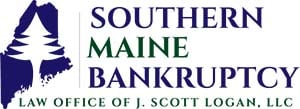Filing For Bankruptcy Relief Can Be A Difficult Decision
For many people, filing for bankruptcy can come with a significant amount of emotional turmoil including shame, fear and uncertainty. When you choose to work with me, J. Scott Logan, you are putting your trust in a bankruptcy attorney with more than 15 years of experience and the knowledge to get you the outcome you deserve.
Understanding Chapter 7 Bankruptcy
In Maine, Chapter 7 is synonymous with bankruptcy. Chapter 7 bankruptcy is the most common form of bankruptcy and is usually the easiest to maneuver. Chapter 7 is a 90-120 day process in which most debts are subject to discharge. Most people are eligible for Chapter 7, especially if their income is below the median income in the state, around $55,000 for one person, $63,000 for two, $70,000 for three, and $75,000 for four. These levels are subject to change. Many whose income exceeds the median are also eligible after deductions are complete. Chapter 7 is known as the liquidation chapter, but most individuals, unlike businesses, can protect all of their property from liquidation.
Under Maine law, you can protect from $80,000 to $160,000 of equity (value above debt owed) in your home; $10,000 of equity in one car; most retirement accounts up to $1 million; furnishings valued at less than $500 each; clothing; $1,000 in jewelry plus a wedding ring; and $10,000 in business tools and equipment. In Maine, you can also protect up to $3,500 in cash or bank accounts.
The Process For Filing Chapter 7 Bankruptcy
In order to complete a Chapter 7, a lengthy petition or form must be prepared, listing all assets, debts, income and expenses. You must be completely honest on this form; otherwise, you risk the bankruptcy court dismissing your case. You must also complete a roughly one-hour online credit course.
After filing the case in bankruptcy court, you must attend a brief meeting with myself and a trustee. If you want to keep your house or car on which you owe money, you might want to consider signing a reaffirmation agreement, which renews your duty to pay the debt but allows the creditor to report payments on your credit report. If you don’t reaffirm, you may be able to keep the house or car by continuing to make payments. If you can’t do that, the creditor will repossess it, but you won’t be liable for any debt on the property. About 60 days after your meeting, you will receive your discharge. You will have to complete a second online course after you file and before the discharge date.
When you file Chapter 7, all creditor contact must immediately stop, and in most instances, your credit card, medical, utility and personal loan debts are discharged at the end of the process. Creditors cannot send 1099s for discharged debt, report the debt as owed, or seek payment. If creditors do seek payment, you may have a claim for damages. I have worked on cases where courts awarded as much as $80,000 in damages for these violations. Unfortunately, student loans, recently filed taxes, trust fund or employee taxes, and child support, alimony obligations or divorce debts usually cannot be discharged.
What Will It Cost?
The costs of Chapter 7 depend upon a variety of factors including complexity. My fees typically no more than $1,799, including the court’s filing fee and the credit counseling course fees. I cannot file your case until the fee is paid in full, but I can set up a payment plan. Once I receive $200 toward the balance, you can tell your creditors you have retained me and stop the dunning calls. Together, we can discuss how to file an answer to a lawsuit to gain more time.
Your Initial Consultation Is Free
At the Law Office of J. Scott Logan, LLC, I am committed to a one-on-one client experience. You will work with the same attorney – me – from start to finish. Do not let considering bankruptcy be a burden you face alone, call me today for a free initial consultation and remove the burden of excessive financial debt today. Call my office in Portland at 207-613-8590 or send me an email to initiate a consultation.

